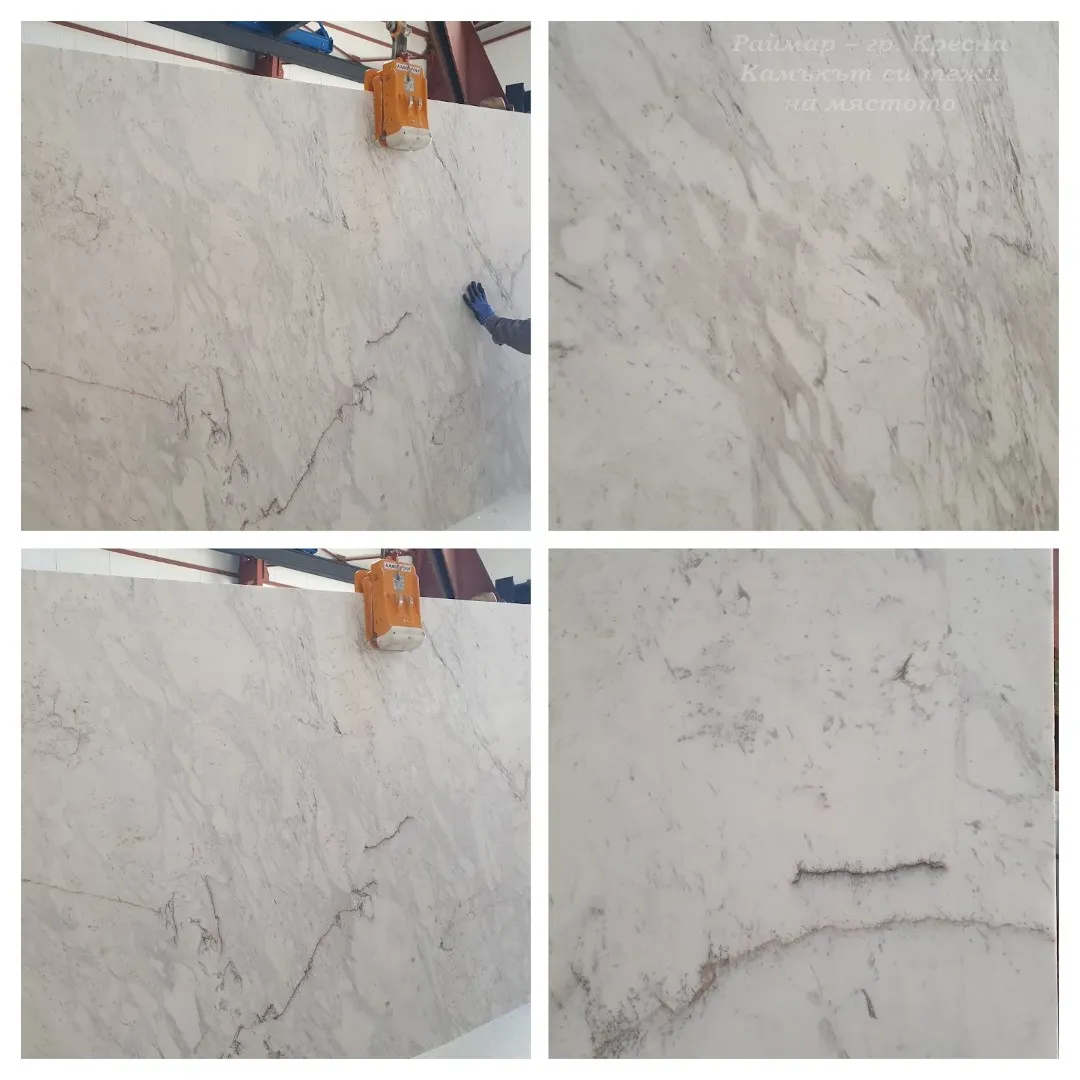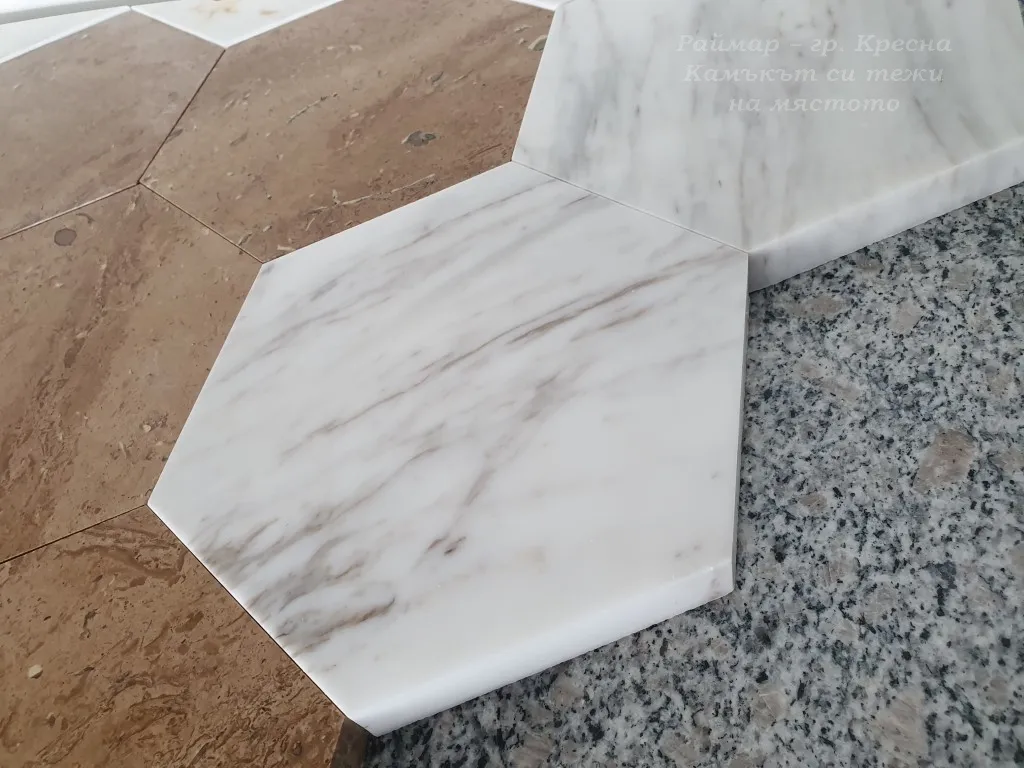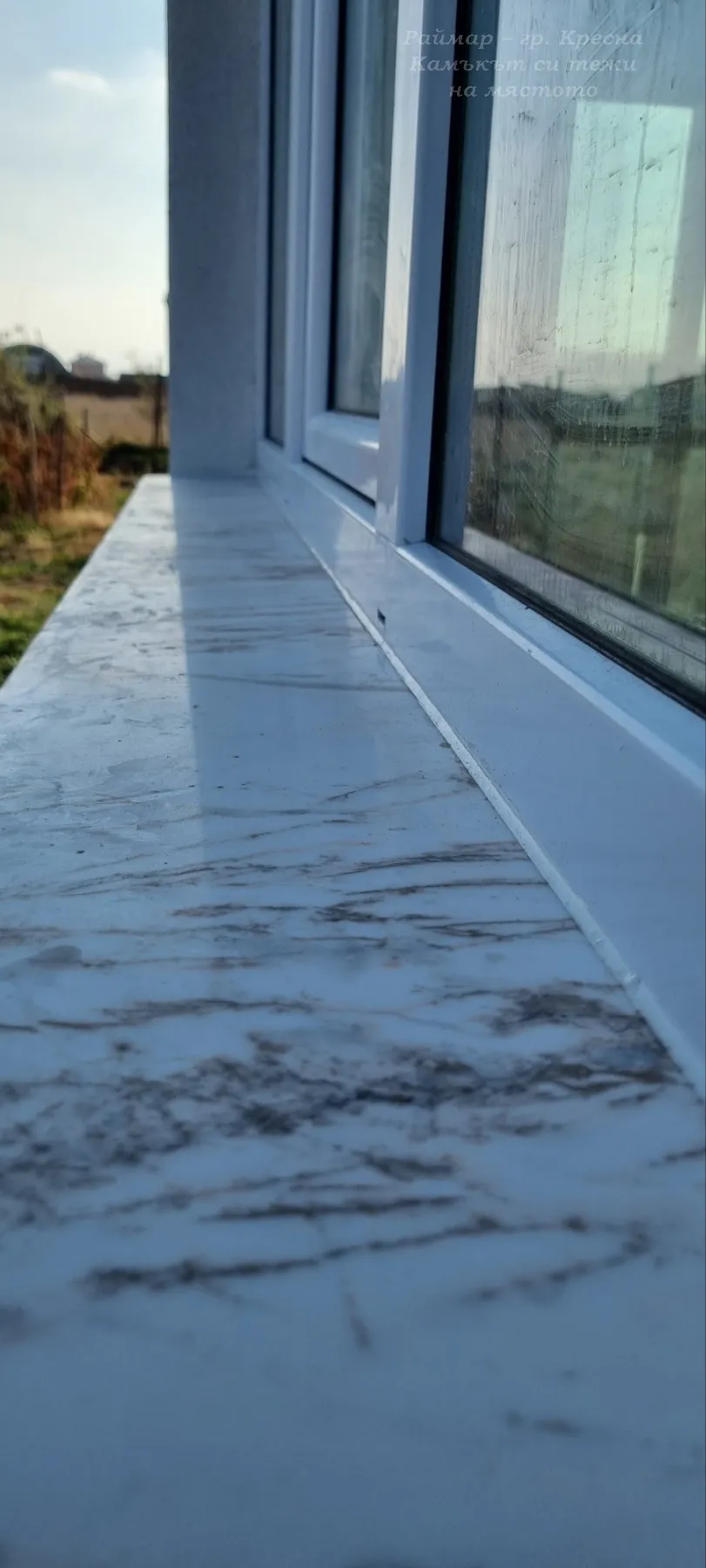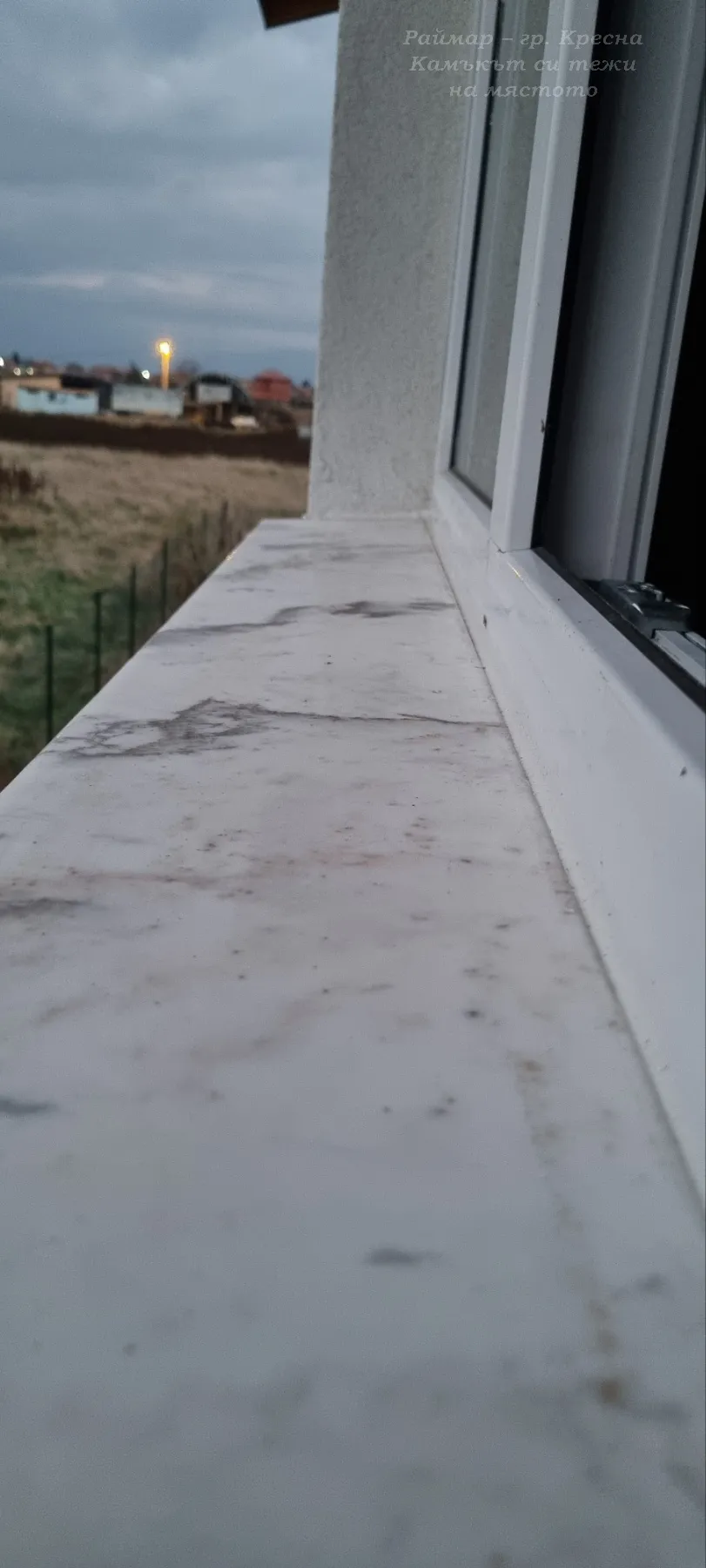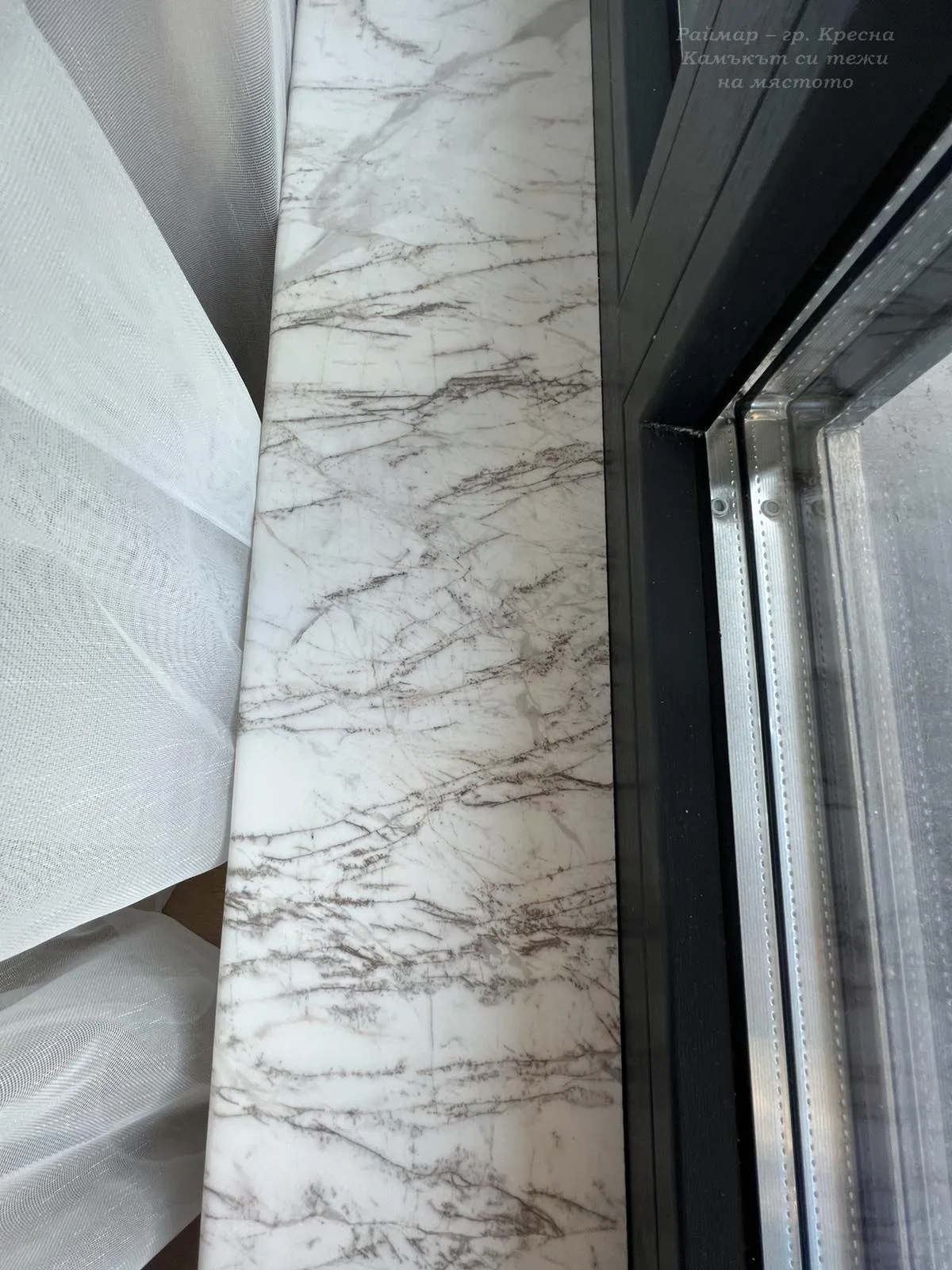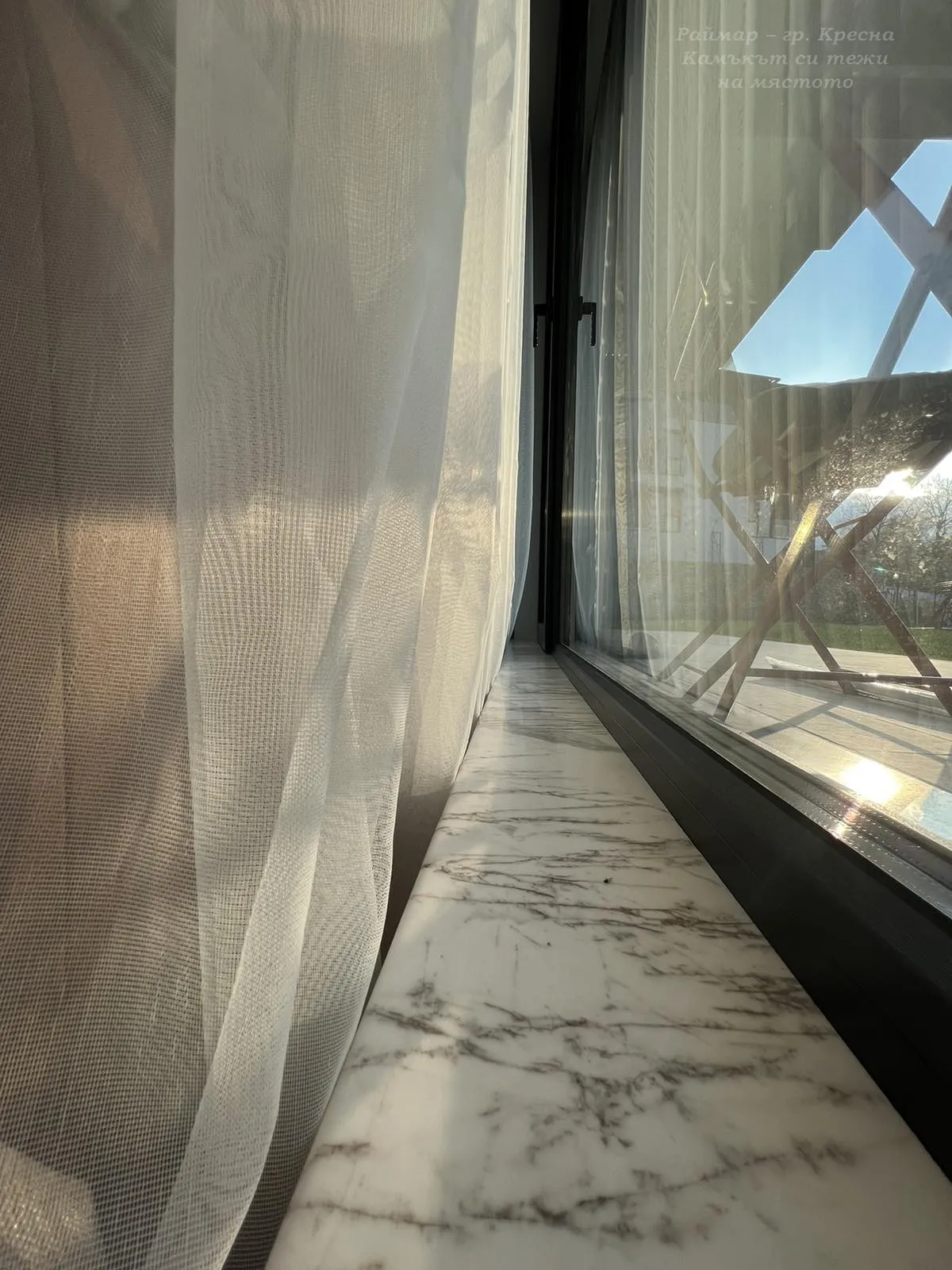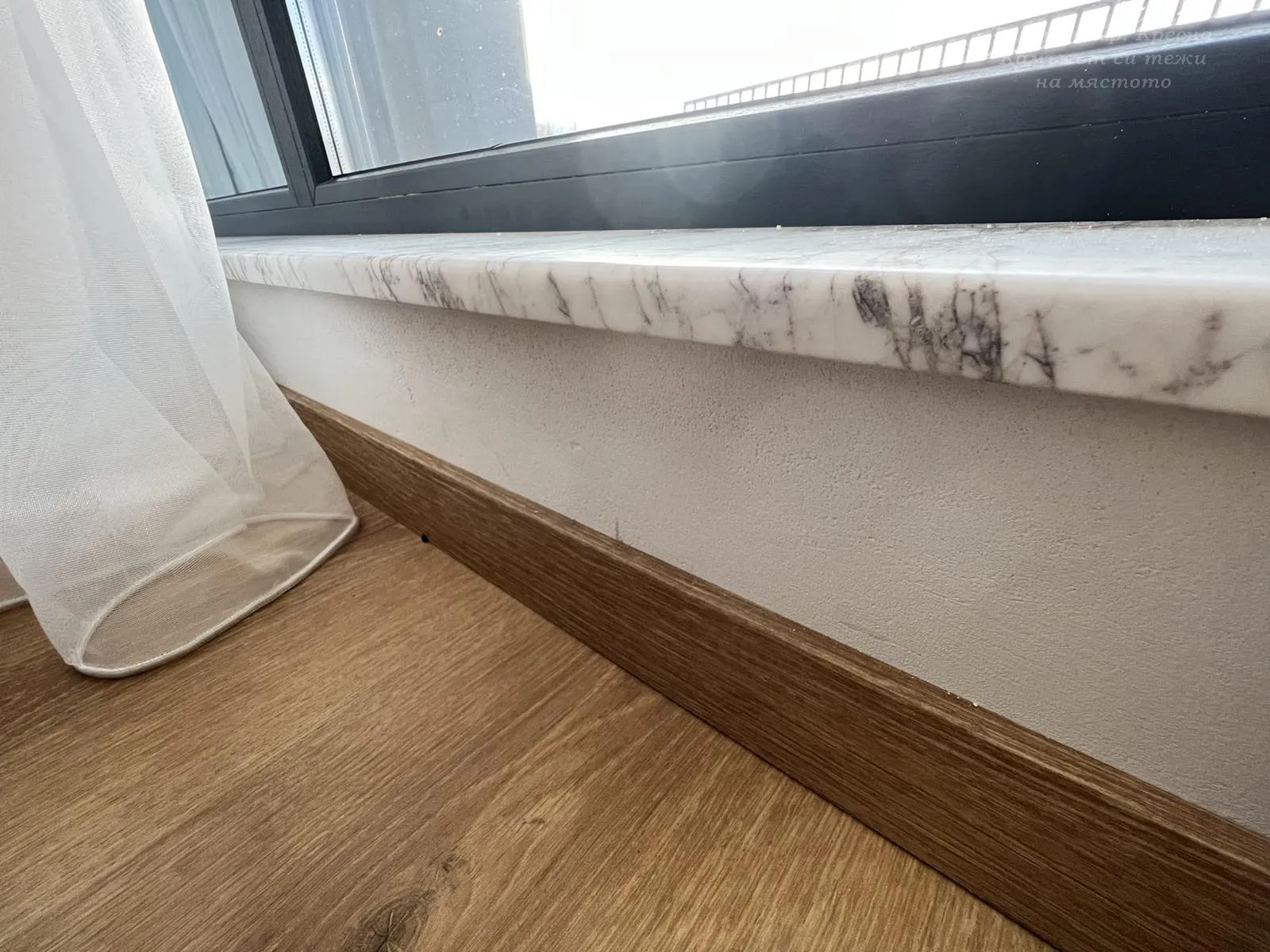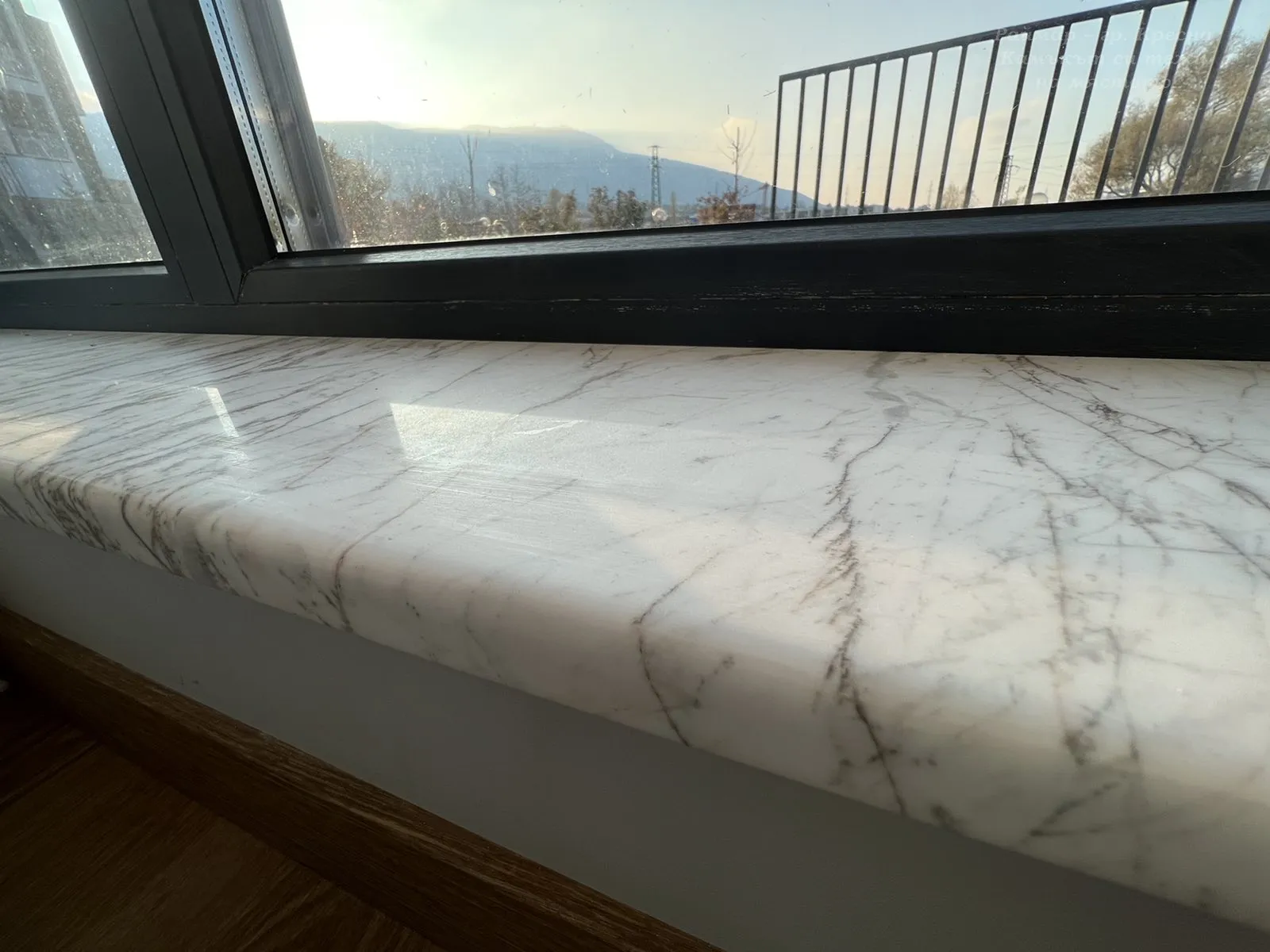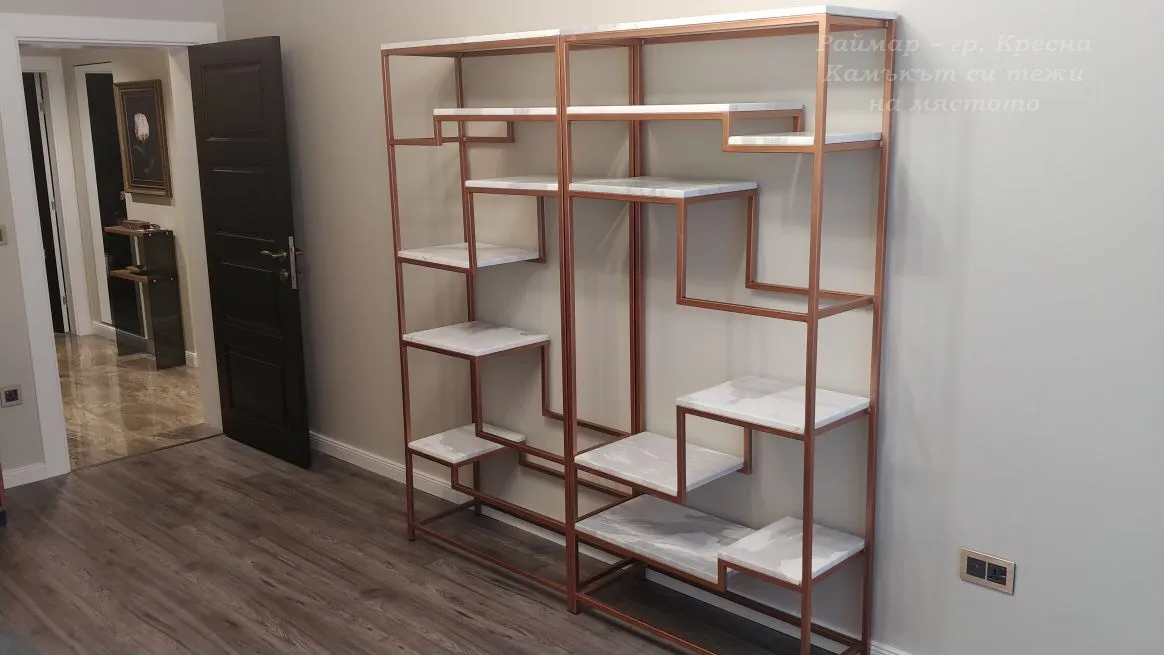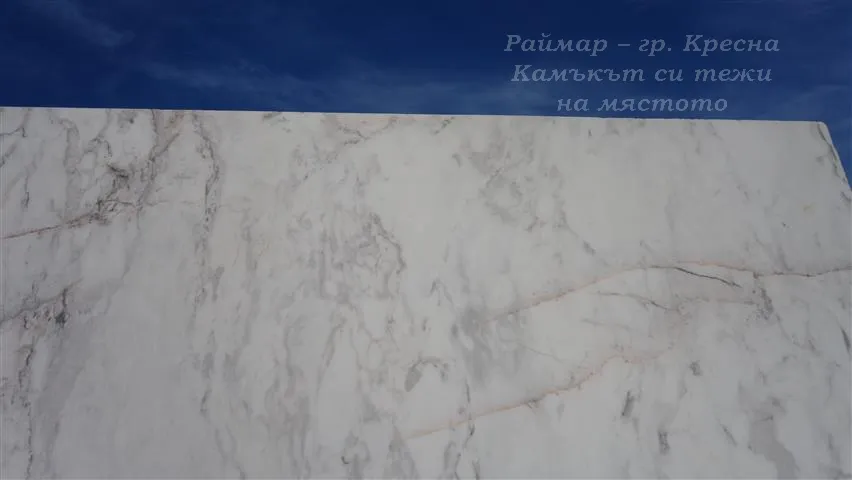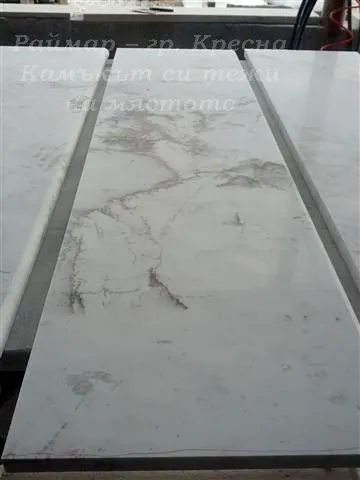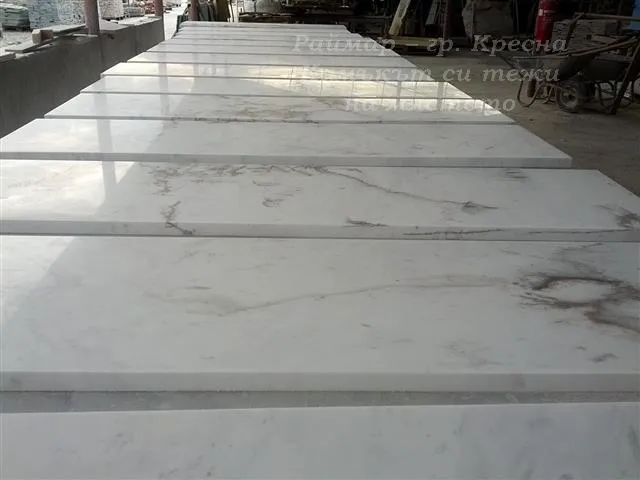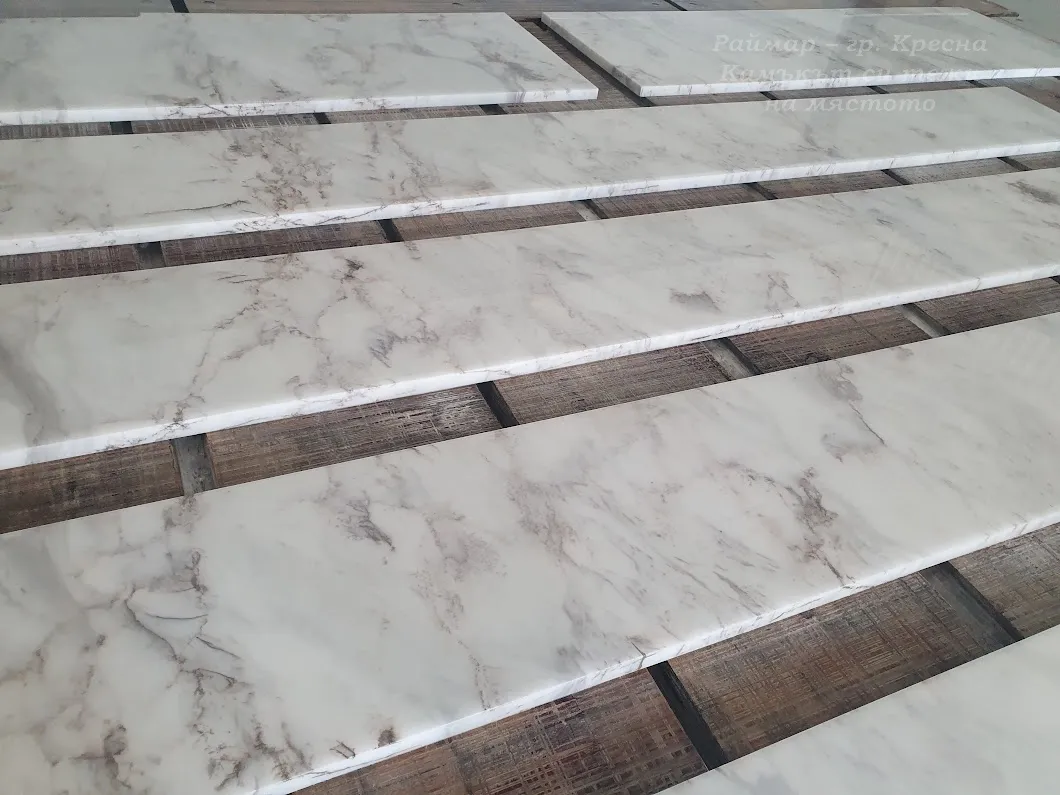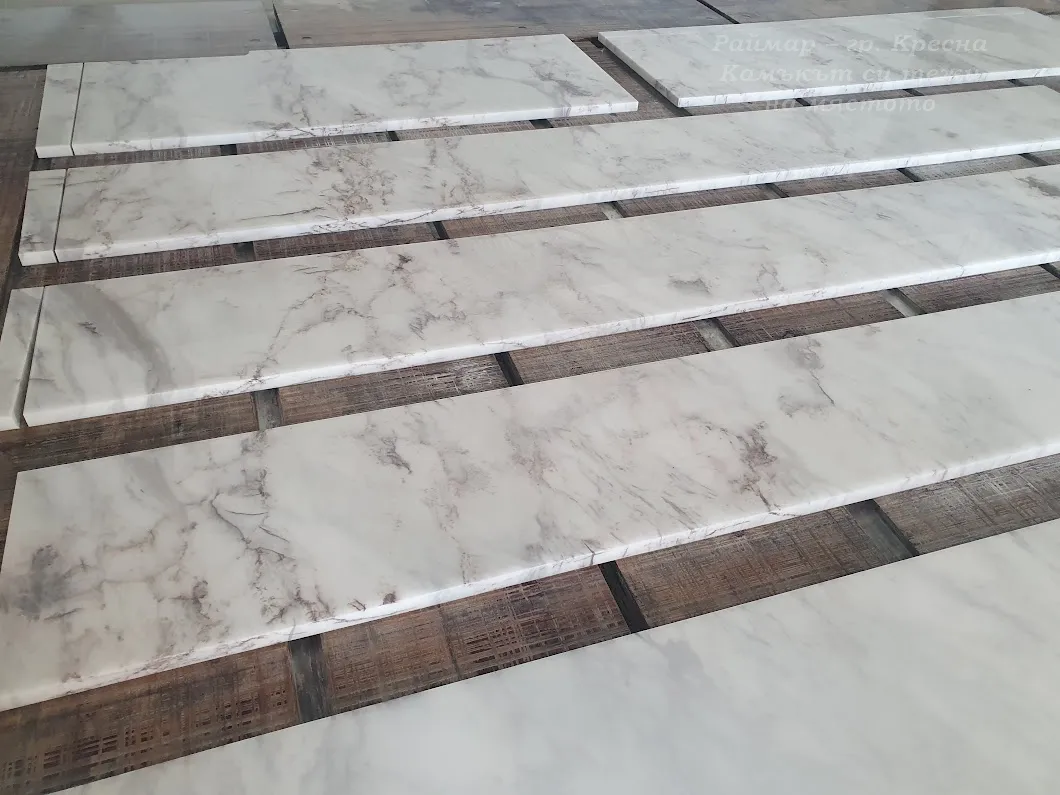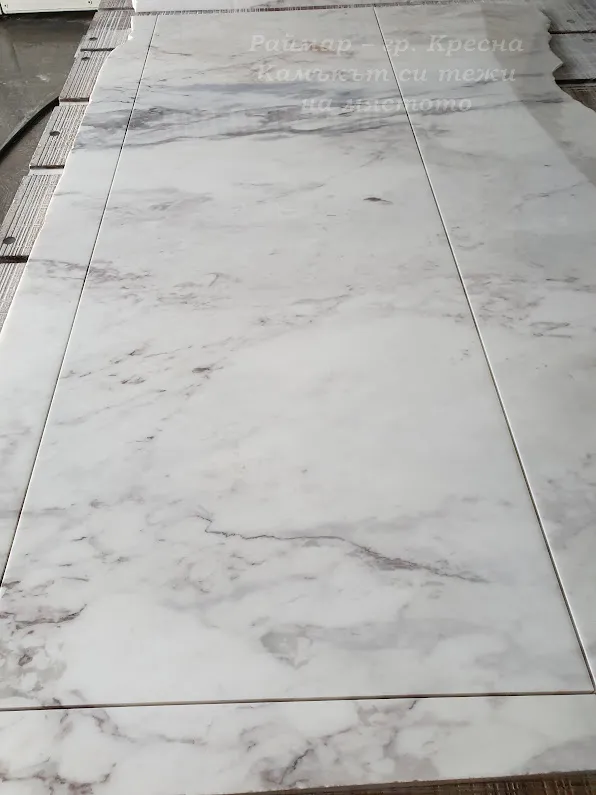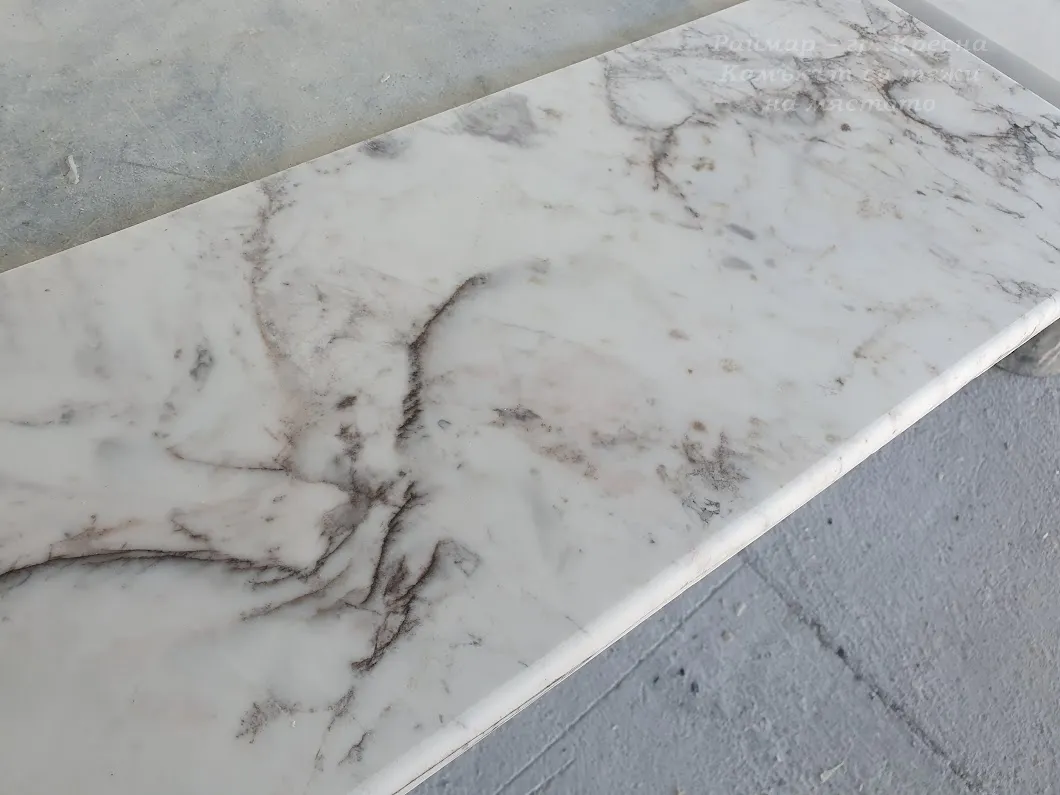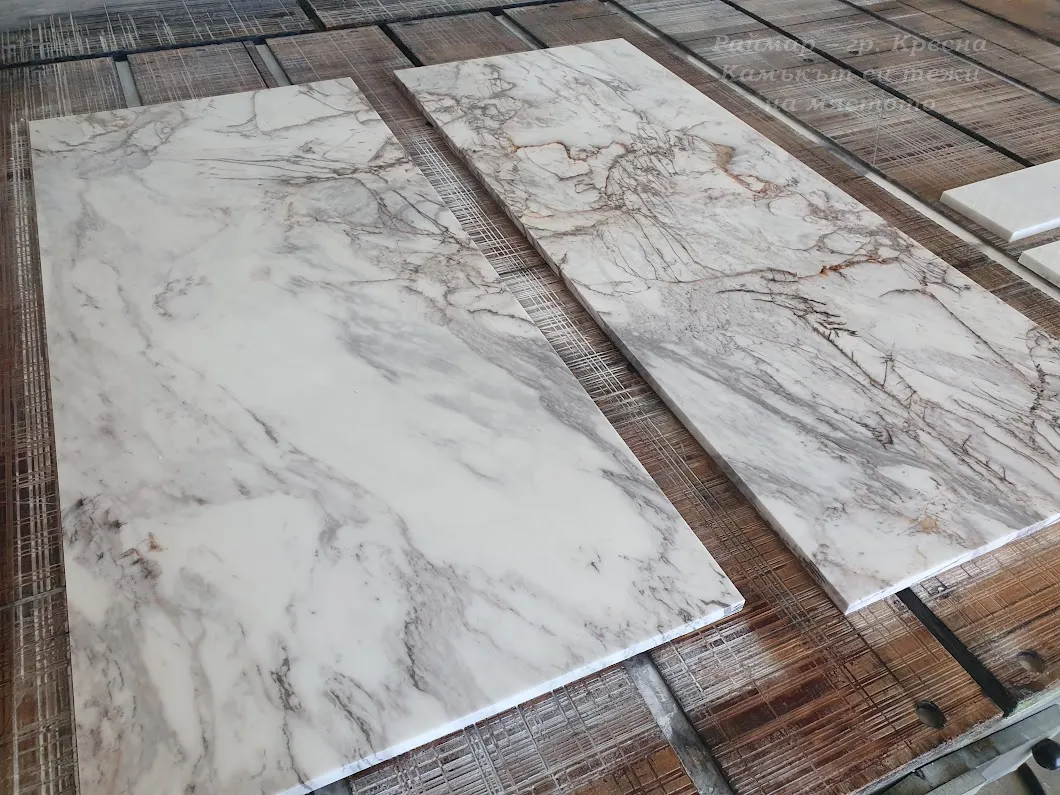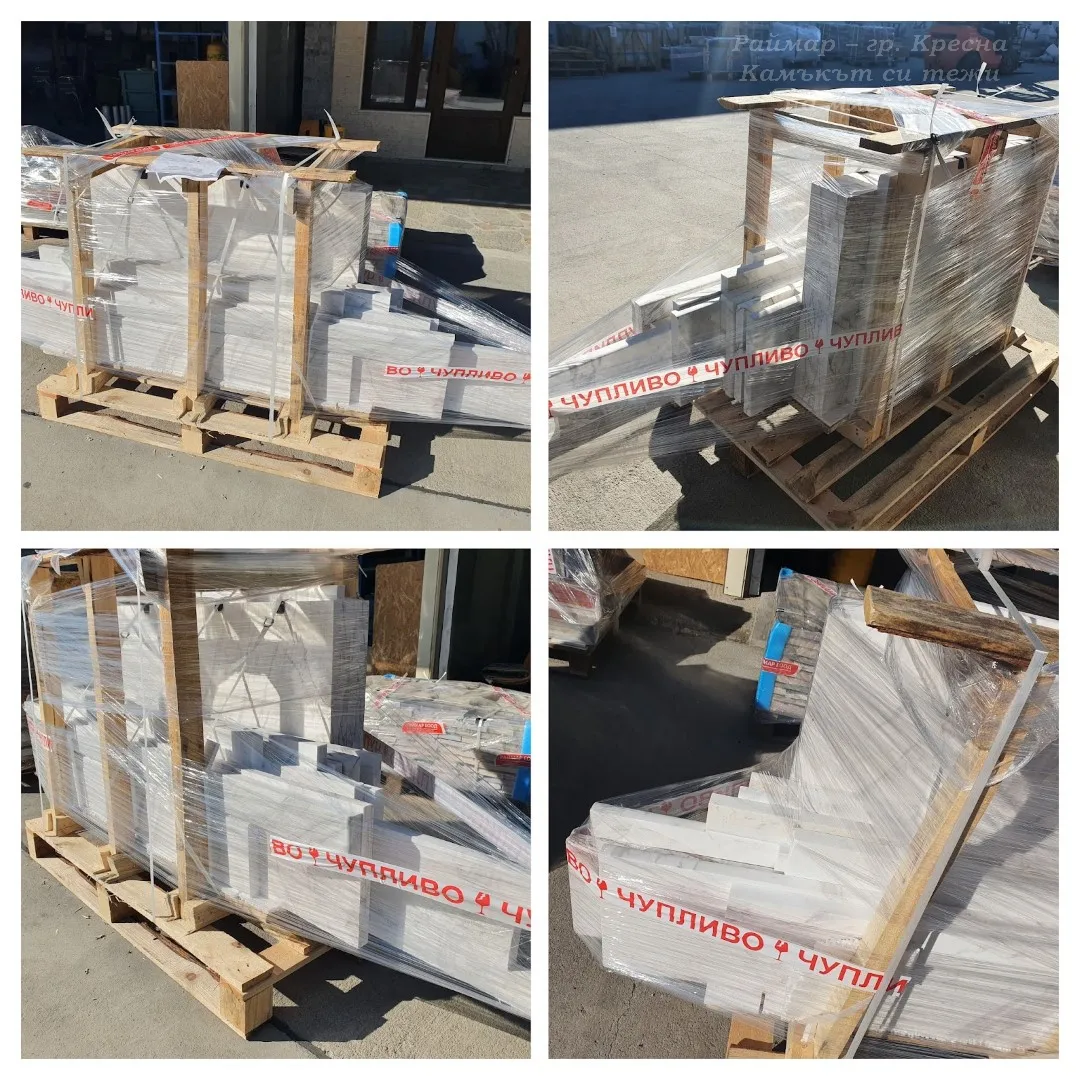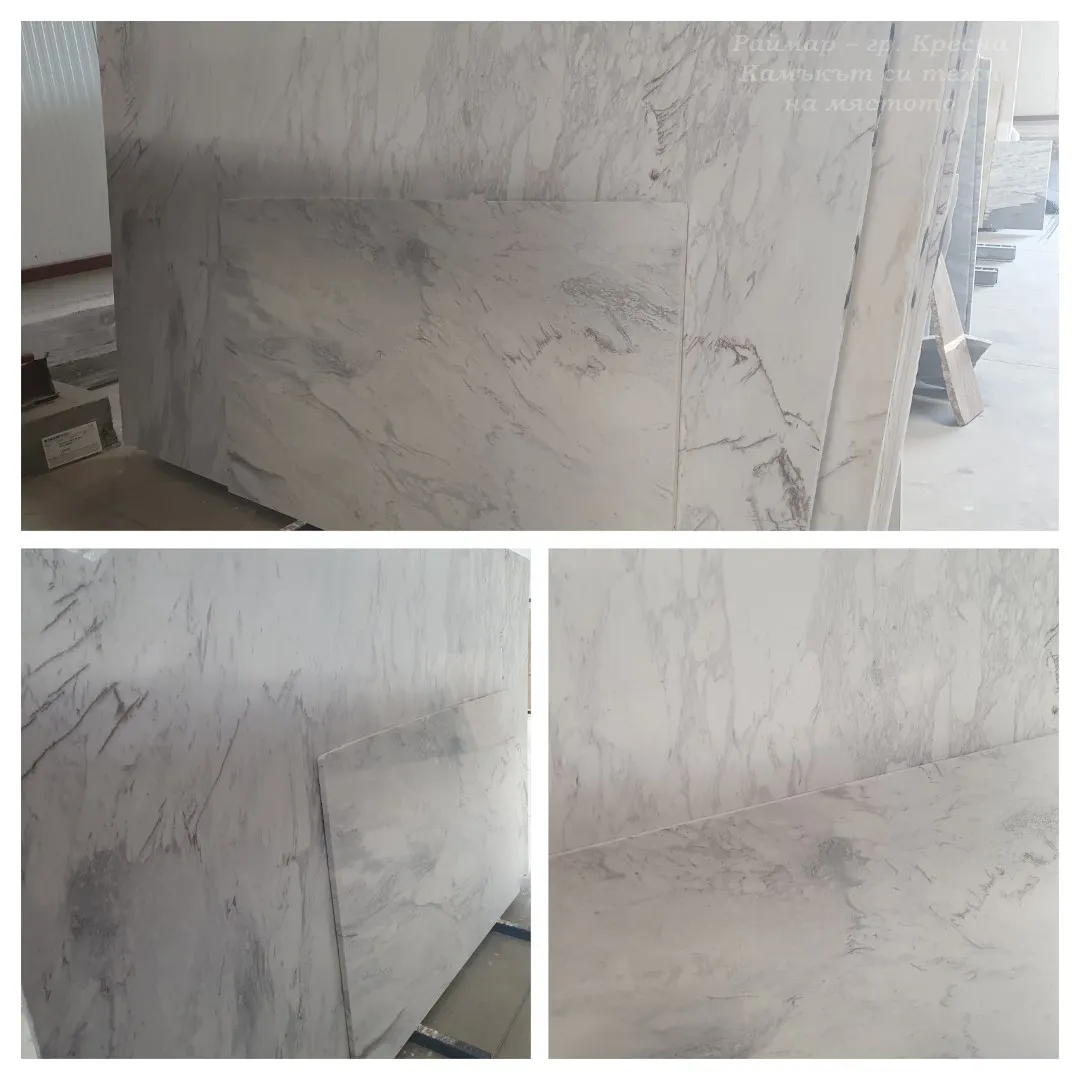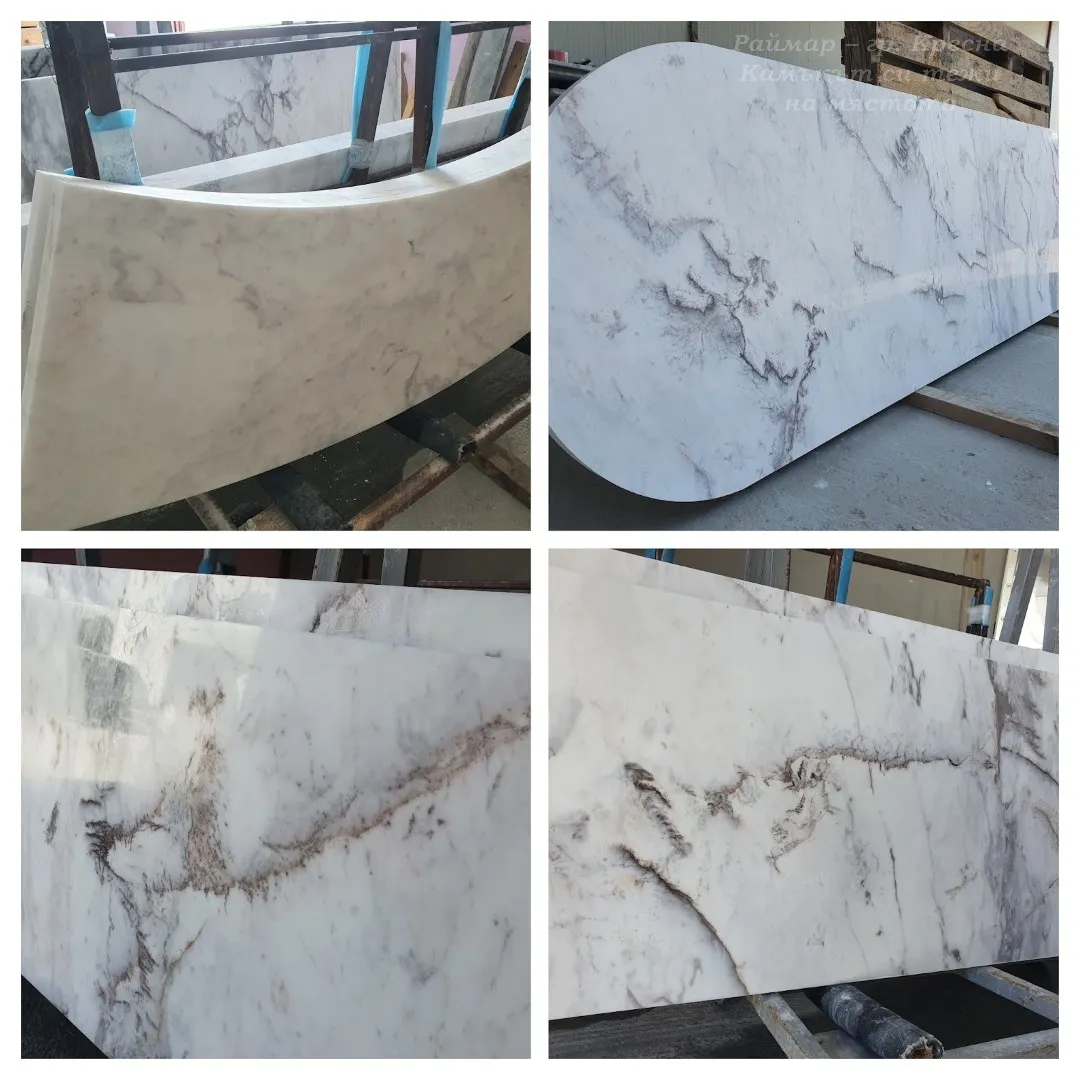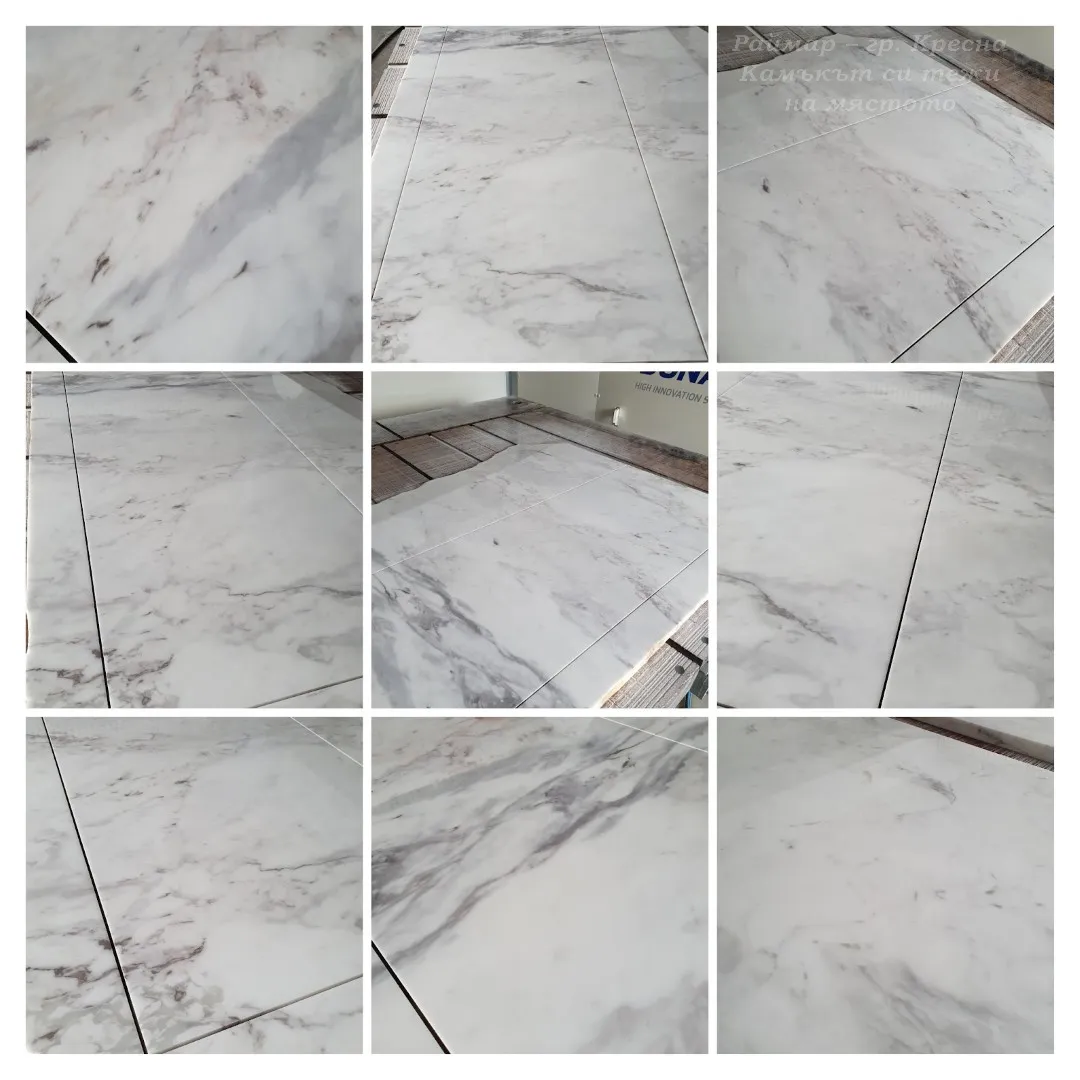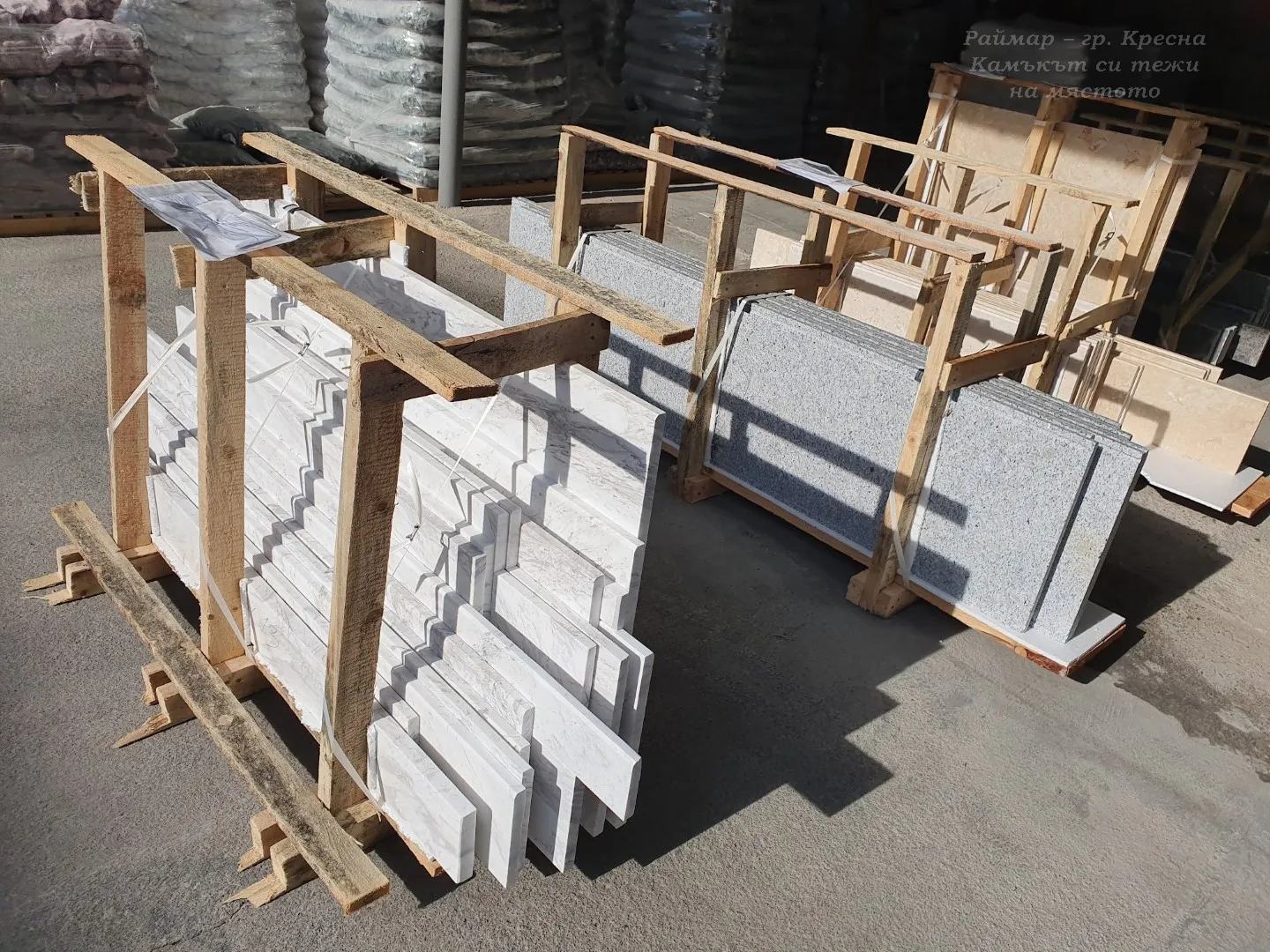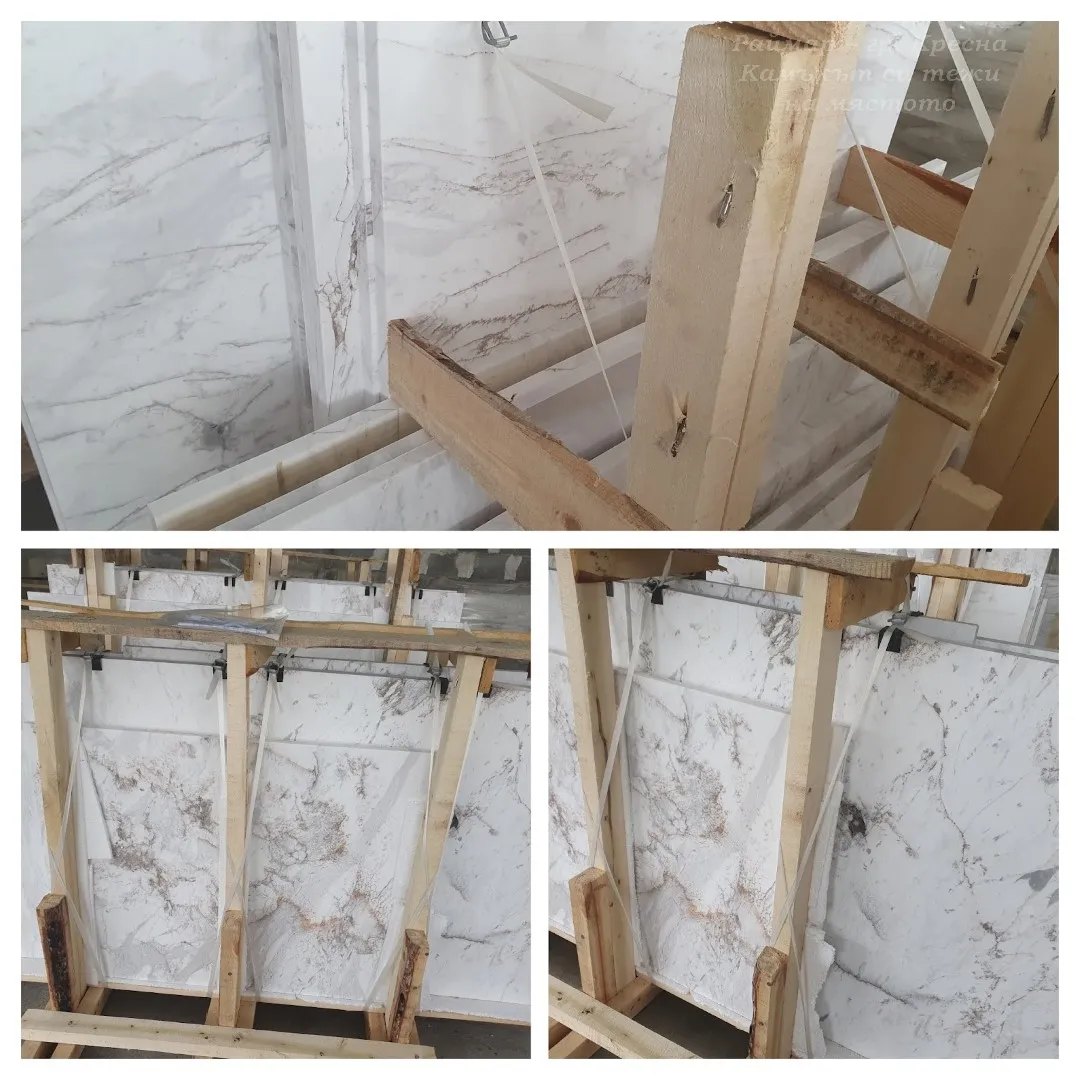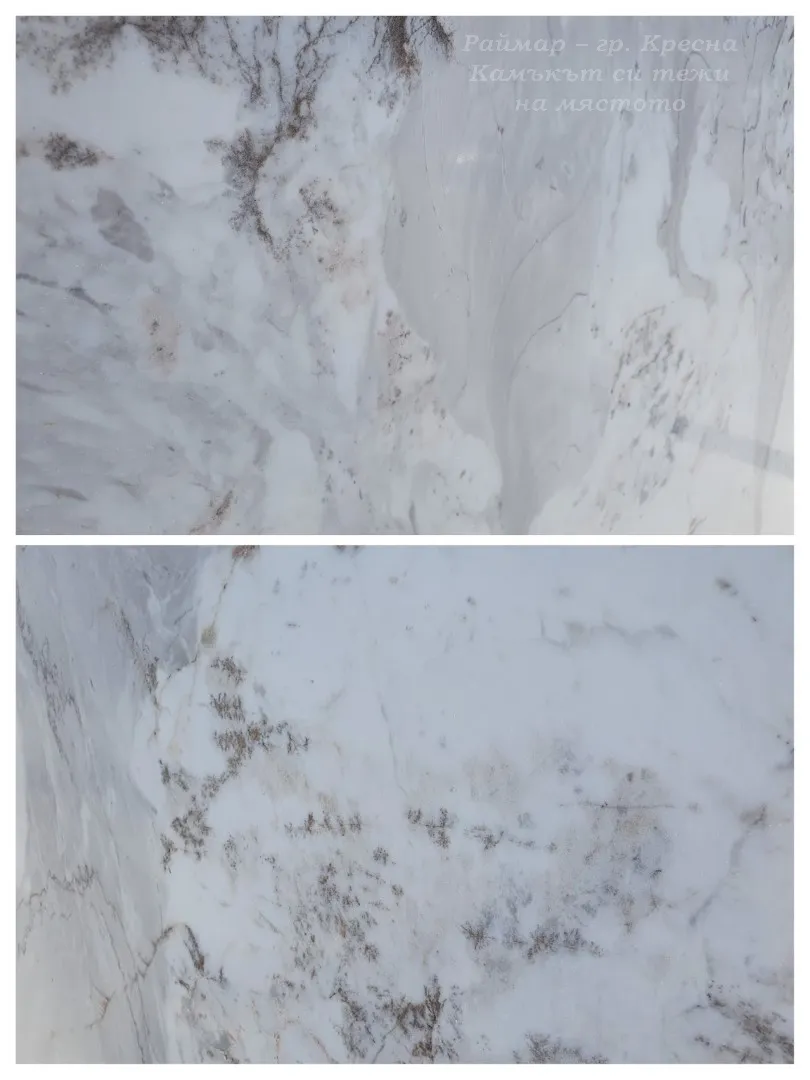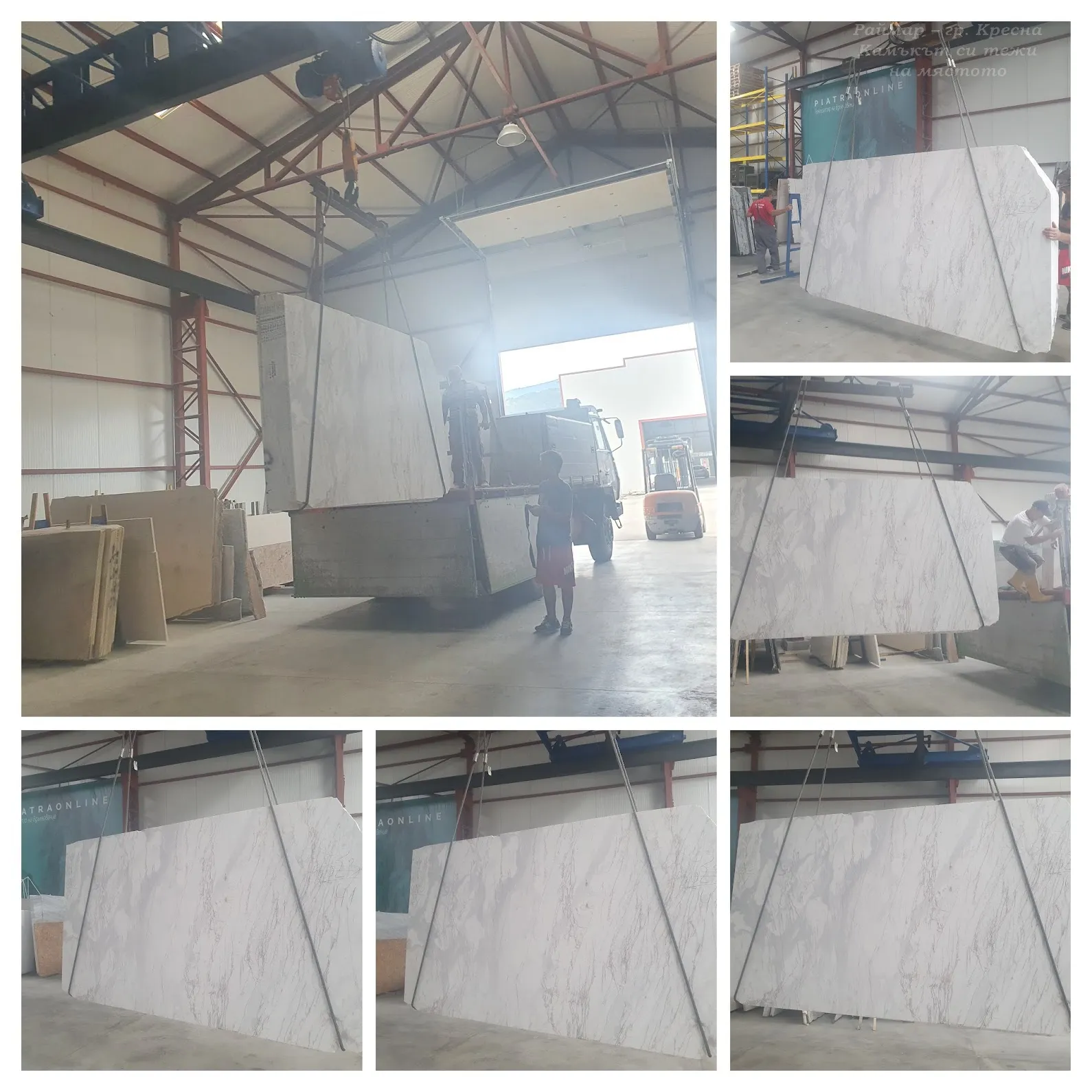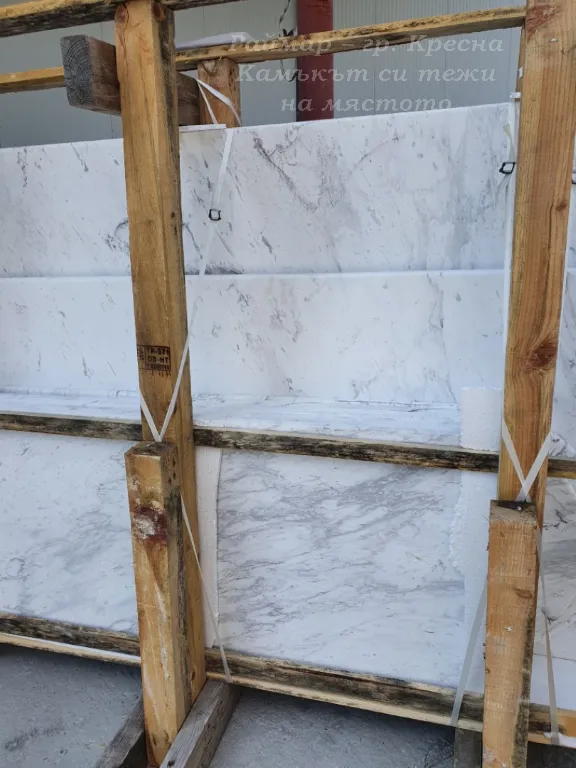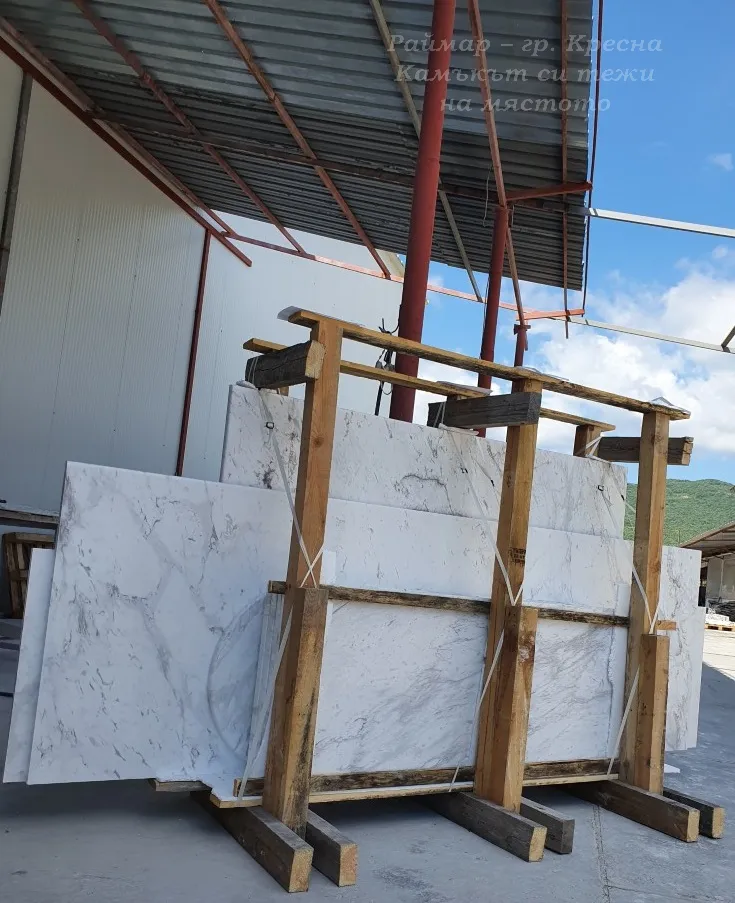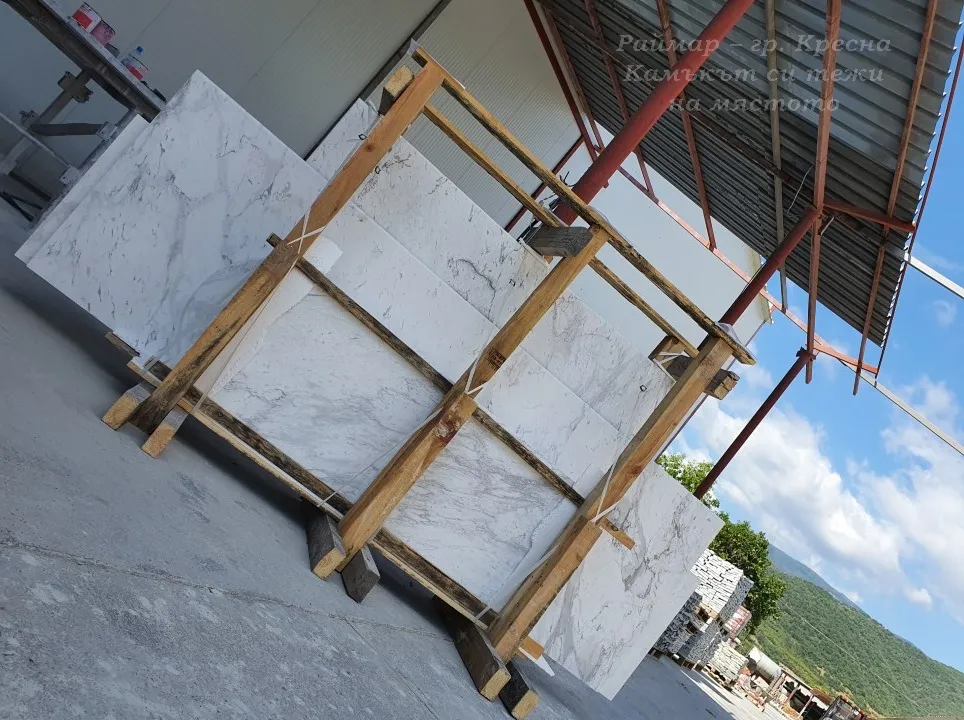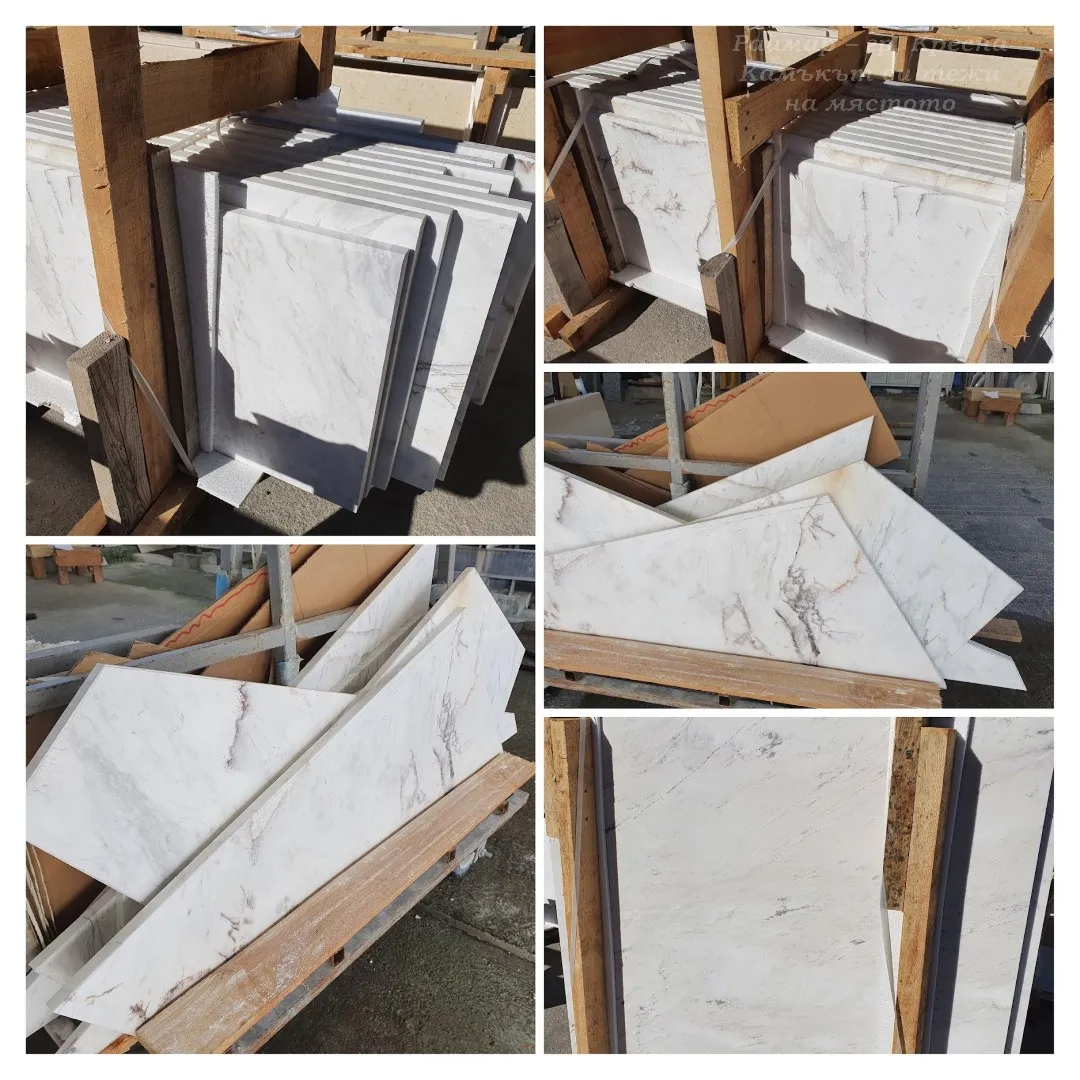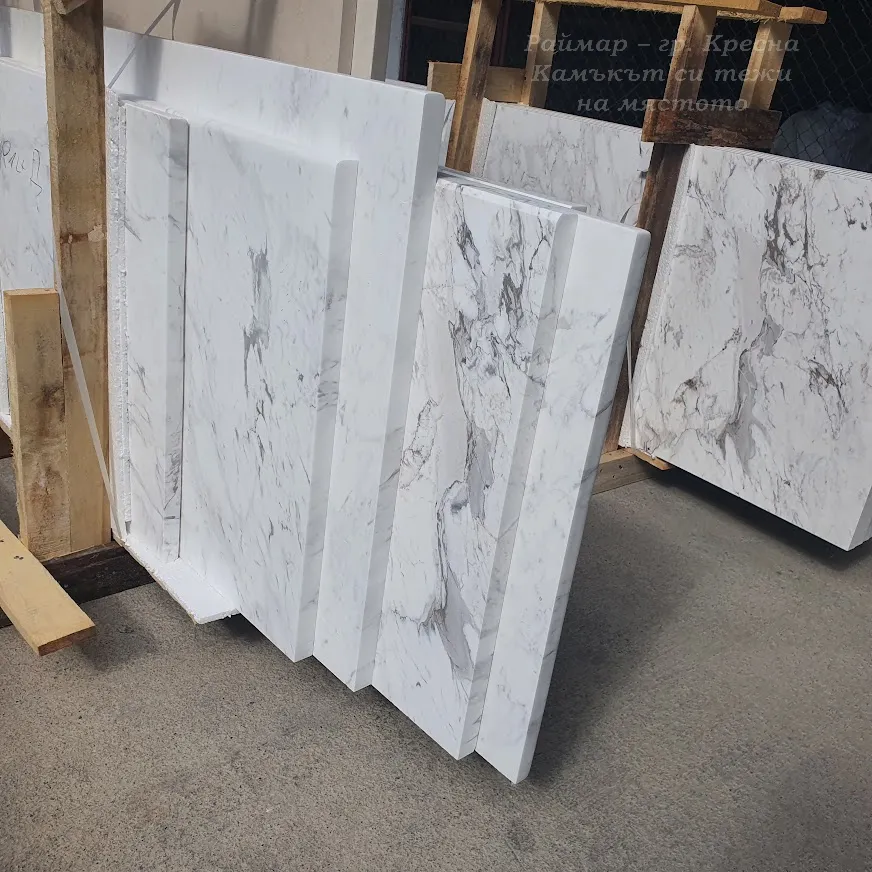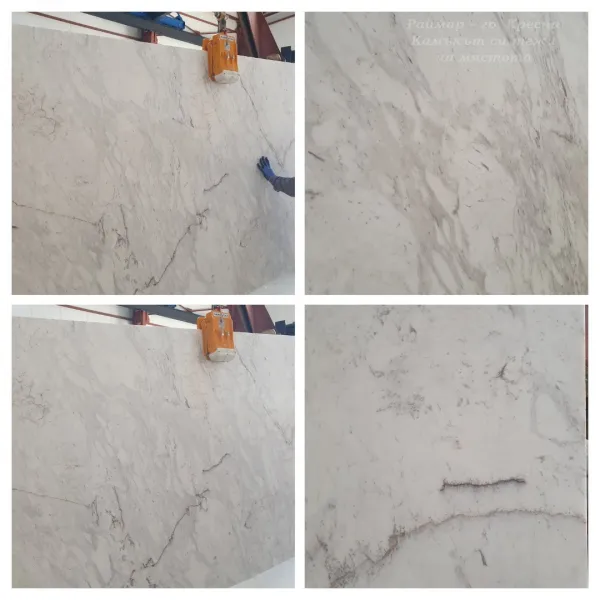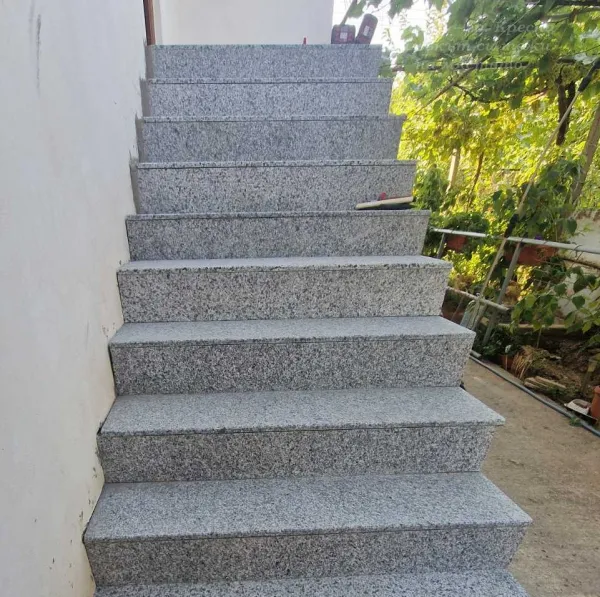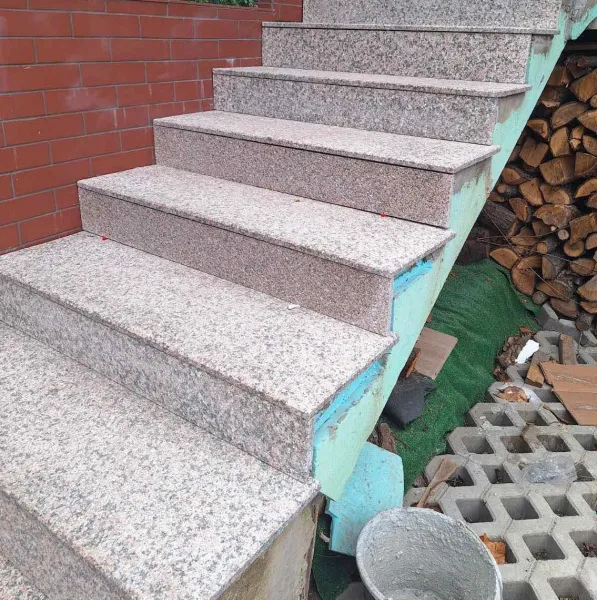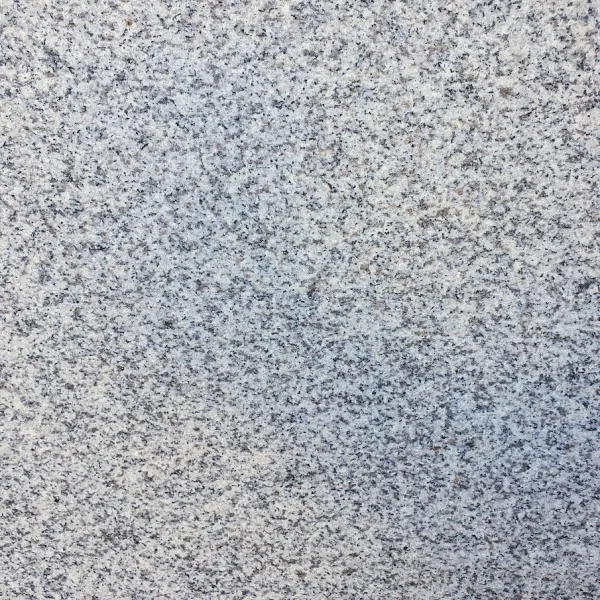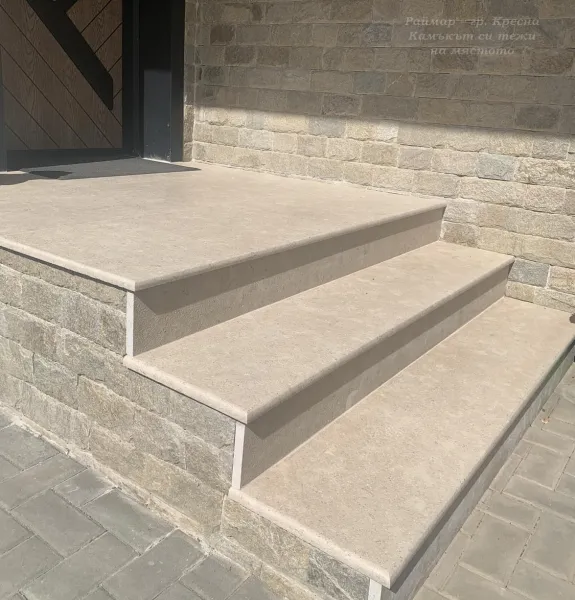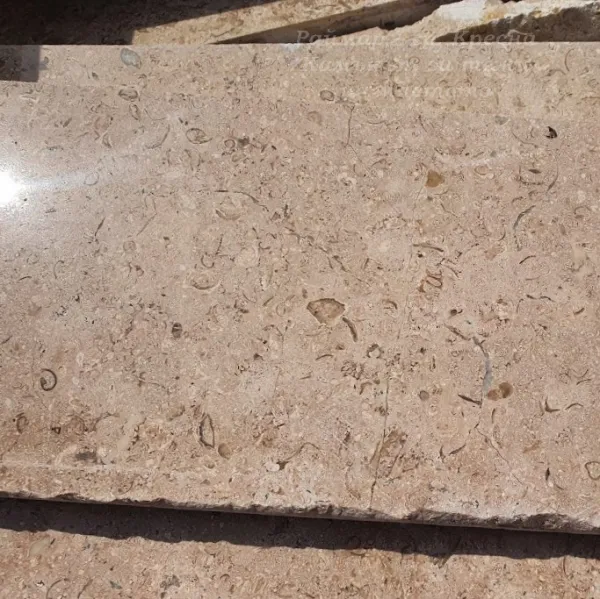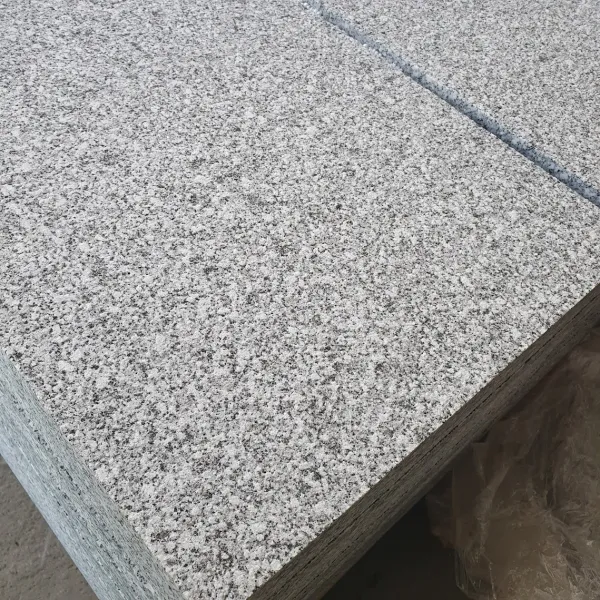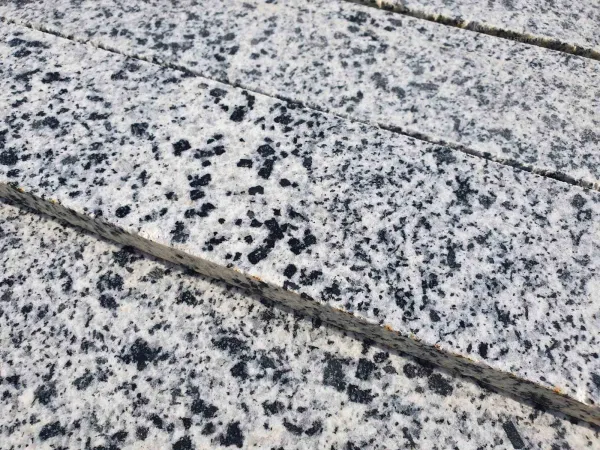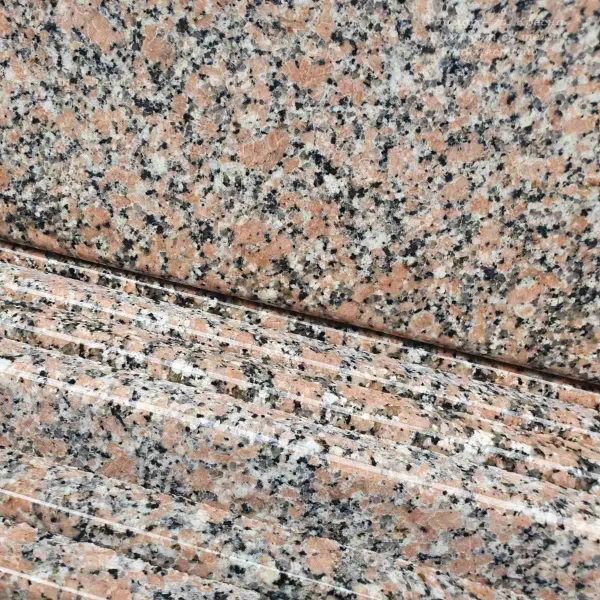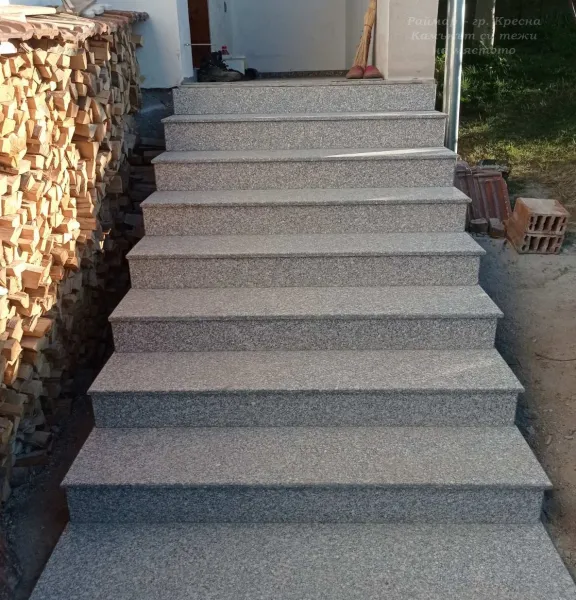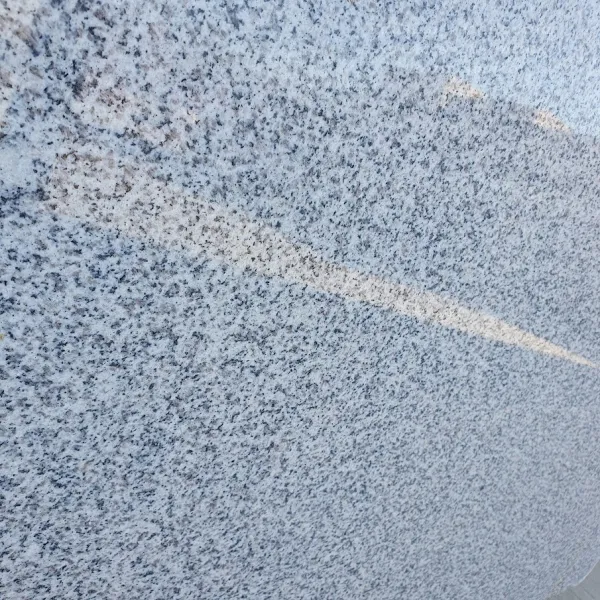Анастасия | Плочи по размер от полиран мрамор
| Наличност | По предварителна заявка |
| Материал | Мрамор |
| Размери на плочите | Рязани по размер плочи |
| Естествен камък | Анастасия мрамор |
| Повърхност (обработка) на камъка | Полирана |
| Цена/ Мерна единица | Цена за 1 кв.м |
| Опаковка | Палет | Kаса | Дървена скара |
| Макс. тегло на пале | Каса: 10-12кв.м = 750кг |
| Дебелина на плочите | 2см |
| 3см | |
| ВАЖНО: Характер и специфики на естествения камък | Възможни са отклонения и вариации в цветовете и текстурата на каменните плочи (резултат от природния произход и формиране на камъка). |
| Рязаните, оформени, каменни плочи са с номинални размери с толеранс до ± 3мм (не са калибровани). | |
| Винаги планирайте аванс от 10% върху чистата квадратура. | |
| Продуктите ни са ръчна майсторска изработка, направени от хора (каменари - занаятчии). | |
| Не е възможно предварително сортиране по цвят или калибър, както и предпочитания на нюанси, шарки или окраски в цветовете на камъка. | |
| Препоръчително лепило за монтаж | Циментово лепило клас C2TES1: C - циментово 2 - подобрени якостни показатели T - фиксиращo, против приплъзване E - с удължено отворенo време S1 - еластично, при линейни разширения (+ добавка ТРАС срещу появата на соли/ ефлоресценция) |
| За бели и светли материали: бяло циментово лепило СуперФикс Флекс C2TE BAUMASTER | |
| За екстериор и интериор: сиво циментово лепило МегаФлекс C2TES1 BAUMASTER | |
| Защита, задължително импрегниране и поддръжка (Импрегнатор на британския производител LTP) | За защита срещу попиване на вода: Универсален импрегнатор за камък (LTP или АКЕМИ) |
| За защита срещу попиване на вода и мазнини: Импрегнатор за камък Матстоун H2O | |
| Винаги почиствайте естествения камък само с PH-неутрални препарати (LTP) | |
| За защита и подсилване на цвета: Импрегнатор "Мокър ефект" |
Гръцкият мрамор Анастасия е бял мрамор със сиви нюанси и кафяви нишки с луксозна полирана повърхност. Дебелината на плочите може да бъде 2 или 3см.
Истинско бижу за всяко помещение той очарова с естествената красота на природния рисунък. Кафявите жилки успешно кореспондират с дървени мебели, паркет или дограма. Придава усещане за луксозна чистота и изискан елегантен стил.
- От полираните фаши от бял мрамор Анастасия ние изработваме изрязани плочи по зададени размери от клиента за подпрозоречни външни и вътрешни первази, стъпала, плотове, шапки на тераса, както и плочки за облицовка на интериорни и екстериорни стени.
- Изпратете ни вашите размери и ние ще предложим остойностена спецификация според количеството на поръчката, както и транспорт до адрес.
- Отбележете в скицата с размерите на запитването си къде трябва да направим заоблянето на плочите, които са за стъпала или подпрозоречни дъски.
Мраморните плочи са подходящи за подпрозоречни первази и стъпала в частни и обществени сгради, също за настилки и облицовки в мокри и СПА помещения, кухни, дневни, коридори, офиси или рецепции… Употребата му дава живот и елегантност на всяко пространство на цена – най-изгодна измежду всички бели мрамори.
Чисто белият мрамор е следствие от метаморфизма на много чист (беден на силикати) варовик или доломит. Характерните завъртулки и жилки в текстурата на много цветни мрамори се дължат на различни минерали, пясък, железни оксиди, кварц, които са присъствали първоначално във варовика под формата на пластове или зърнести структури. Всички тези елементи са били мобилизирани и ре-кристализирани от огромните налягане и топлина при метаморфизма.
От древни времена белият мрамор се цени в скулптурата заради неговата податливост и устойчивост на извайване. Благодарение на ниския индекс на рефракция на калцита, светлината прониква няколко милиметра в камъка преди да се разпръсне, в резултат на което се получава характерният „восъчен“ блясък, който вдъхва живот на човешките скулптури от мрамор. Всички ренесансови скулптури на Микеланджело са от мрамор, а това е бил любимият камък и на всички гръцки и римски скулптори и архитекти. Надали случайно.
Тенденцията да използваме по-малко преработени и изкуствени материали е по-силна от всякога. Мраморът е истински красив, естествен продукт с репутация на издръжлив материал, градена с векове. Неговата специфична чистота е повод за възхищение от древността и така ще бъде и занапред.
Като всяко красиво нещо и като всеки естествен материал, камъкът се нуждае от подходяща грижа и поддръжка.
Ние препоръчваме: винаги импрегнирайте каменните повърхности с правилните препарати за естествен камък!
Независимо от вида камък и местоположението, еднократното намазване с импрегнант, ще ви спести излишни вълнения и ще услесни в пъти поддръжката.
Всяко нещо се нуждае от грижи. Използвайте супер качествените немски препарати на АКЕМИ, с които работим и препоръчваме от години.
Намазаната импрегнирана повърхност не позволява на вода и замърсявания да попиват.
Защитата с импрегнатор осигурява устойчивост срещу разрушителните цикли на замръзване-размразяване при външни условия. Водата просто не попива, когато каменната повърхност е импрегнирана, а стои на капки.
В зависимост от вида импрегнатор, той може да не промени външния вид на камъка или да задълбочи цветовете. Изберете:
- "Универсалният" импрегнатор, който не променя вида на камъка и защитава срещу вода
- "Мокър ефект" - мощен импрегнатор, като Универсалния, но цветовете изпъкват в по-интензивен контраст
- "Без петна" е най-добрият импрегнатор: защитава срещу вода и мазнини, който също не променя външния вид на камъка.
Кога трябва да се случи повторно нанасяне, зависи от типа естествен камък външни влияния, условията и експлоатацията на каменните плочи (дали е настилка/ облицовка и интензивност на трафика). Обикновено производителят АКЕМИ препоръчва:
- за интериорна стенна облицовка: на всеки 10 години
- за екстериорна стенна облицовка: на всеки 5 години
- за настилки с интензивен трафик и мокри помещения: на всеки 2 години.
Как се нанася импрегнатор? - Лесно, като детска игра. Каменната повърхност трябва да е чиста и много суха. Течността, без да се разрежда, се намазва с валяче, гъба или четка. Ако повърхността е гладка полирана или мат, е необходима втора стъпка: така нареченото "лъсване" с микрофибърна кърпа 20мин., след като е нанесен импрегнаторът. И сме готови.
С какви препарати се почиства естественият камък? - Някои видове камък, като мрамора и травертина, са чувствителни към киселинните, много силни препарати за почистване (напр. белина). Ние препоръчваме: винаги почиствайте каменните си повърхности с PH-неутрално почистващо средство.
Питайте ни, ако имате още въпроси! Ние сме насреща и с радост ще съдействаме.
Как да вдъхновим
нов живот на естествения камък в екстериора?
В няколко стъпки
естественият камък може да бъде възстановен до първоначалното му състояние, в
пълния си блясък и естестика.
На първо място е редовното почистване и поне веднъж годишно основно измиване с водоструйка. Това особено важи за продуктите ни от градинско обзавеждане (барбекютата, мивките, масите, плотове и тротоарните плочки).
След като
повърхностите са чисти и сухи, не забравяйте да намажете с импрегнатор.
Съвет: Пазете външните
си настилки от мебели, които изпускат ръжда.
При замърсявания
от специален характер като мазни петна, образувана ефлоресценция (циментово
мляко), плесен, остатъци от цимент или фугиращи смеси, силикони или бои, е
най-добре да се свържете директно с нас за консултация. Разчитайте на нас, ще
ви предоставим правилните препарати за разрешаване на проблема, където и както
е възможно.
Издръжливостта на
естествения камък зависи от специфичната порьозност на вида камък и нивата му
на абсорбация вода. Например, порьозността на гранита и гнайса е около 1%,
докато на пясъчника е повече от 20%.
Най-големите разрушителни
врагове за предмети, облицовки и настилки, които са целогодишно навън, са
слънцето и цикли на замръзване/ размразяване. Когато камъкът е импрегниран, ще
получите максимална защита и много по-лесна поддръжка.
При тежки случаи
на места със замърсявания, каменната неполирана повърхност може да бъде
обработена с ъглошлайф и фини шкурки. По този начин се прамахва най-горния слой
на камъка и става като нов. (Процесът е същият както при шлайфане на дървен
паркет.)
Камъкът е
най-добрият приятел на двора и градината. С любов към красивите, естествени
материали и правилната грижа, камъкът ще продължи да ви радва много години
напред.




 English
English




